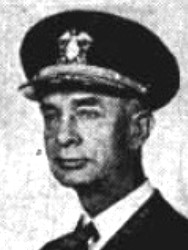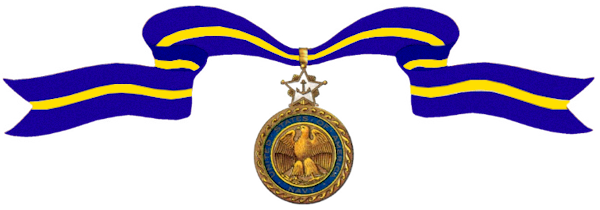Frank Wagner graduated from the U.S. Naval Academy at Annapolis, Class of 1915. He retired as a U.S. Navy Vice Admiral.

Awards Received
-

Navy Distinguished Service Medal
-

Legion of Merit
-

Navy Distinguished Service Medal
-
Navy Distinguished Service Medal
Service:
United States NavyRank:
Rear AdmiralAction Date:
July 9, 1944 – August 25, 1945
Bureau of Naval Personnel Information Bulletin No. 348 (March 1946)The President of the United States of America takes pleasure in presenting a Gold Star in lieu of a Second Award of the Navy Distinguished Service Medal to Rear Admiral Frank Dechant Wagner, United States Navy, for exceptionally meritorious and distinguished service in a position of great responsibility to the Government of the United States while Commander Air, SEVENTH Fleet, from 9 July 1944 to 25 August 1945. Admiral Wagner’s leadership inspired aircraft under his command to establish a remarkable record of achievement in operations from New Guinea to the Philippine Islands and Borneo. Through his careful planning and direction numerous airfields, expeditiously constructed in the Philippines and the Netherlands East Indies under extremely difficult and hazardous conditions, proved of great importance to the eminent success of these operations.
-
Legion of Merit
Service:
United States NavyRank:
Rear AdmiralAction Date:
August 18, 1943 – April 6, 1944
Bureau of Naval Personnel Information Bulletin No. 353 (August 1946)(Citation Needed) – SYNOPSIS: Rear Admiral Frank Dechant Wagner, United States Navy, was awarded the Legion of Merit for exceptionally meritorious conduct in the performance of outstanding services to the Government of the United States as Deputy Chief of Naval Operations (Air) from 18 August 1943 to 6 April 1944.
-
Navy Distinguished Service Medal

Bureau of Naval Personnel Information Bulletin No. 304 (July 1942)The President of the United States of America takes pleasure in presenting the Navy Distinguished Service Medal to Captain Frank Dechant Wagner, United States Navy, for exceptionally meritorious and distinguished service in a duty of great responsibility as Commander of Patrol Wing TEN during operations against the enemy in the Far Eastern Areas during World War II. Due to his splendid leadership in both the operation and administration of his command, Patrol Wing TEN continued to render invaluable service in reconnaissance and bombing operations throughout the campaign for the defense of the Netherlands East Indies. Information of the enemy obtained and furnished by the units of his command was invariably timely and accurate, in spite of conditions under which flights had to be made under his direction with the enemy in positive control of the air. Captain Wagner’s conduct and that of his command throughout this period has been in accord with the best traditions of the Service.

